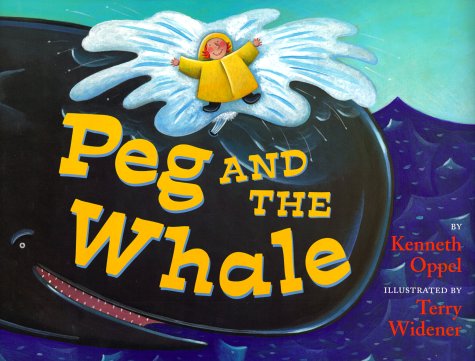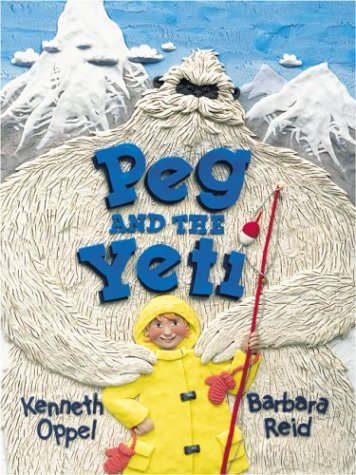What do these books have in common? They've both been nominated for a Cybils award, and they're both written by Canadian authors! (And I've read them both in the last week. So they have tons in common. Despite being completely opposite in nearly every way.)
The not scary book first:
Clover's Luck is the first book in a series called Magical Animal Adoption Agency, and can you think of a more brilliant idea for an early chapter book series? because I can't! This book is as cute and sweet as it looks, but it's also funny and clever.
Clover earnestly attempts to match up various magical people with the most appropriate magical pet, even though she herself has been terribly unlucky when it comes to pets. The animals are delightful, and the details of their care and feeding are a lot of fun (eg: Clover deduces that hot peppers are the best food for the fire salamanders). To complicate matters there's a witch with increasingly ridiculous disguises and a fiendish (but not at all scary) plan.
Clover's combination of diffidence about her own skills but genuine care for the animals makes her a truly engaging protagonist. Young readers will be charmed by the magic and will be rooting for Clover. I know I can't wait to read the next one and see what will hatch out of the egg that arrived at the end! The illustrations, by the way, are perfect: soft sketches that just capture the personality of each animal.
Full disclosure: I know Kallie, and I'm beyond thrilled for her that this series is coming out. I wouldn't have reviewed the book if I didn't like it, though, so it's honest praise!
And, two days too late for Halloween, a very creepy book that rivals
Coraline for scariest story I've ever read:
First of all, you have to go find
The Nest in a bookstore and pick it up. It has the coolest cover ever! So effective! You can't get the 3-D aspect of it from a picture, and I imagine that a library copy is all taped up so you can't see the under-cover, so do go to your closest (local independant) bookstore. And then, if you're like me, once you pick it up you'll notice the utterly gorgeous, perfectly moody illustrations by Jon Klassen, and you'll just want to own the book anyway. It's a work of art.
So, wasps. The cover makes that obvious so I'm not spoiling anything. There are wasps in this story. Wasps are inherently terrifying—bees are cute and benevolent; wasps are not; I'm sorry, I know that's speciesist, but I can't help it—especially if you're allergic to them, which our protagonist Steve is. That inherent dread runs through the whole story. But what Kenneth Oppel does with wasps is brilliant and mind-blowing and so much more terrifying because mmmbbblefarg! I can't say anything useful without completely spoiling it, so I won't. Let's just say that this is not a book about people being chased by wasps, oh, isn't that scary, the end.
Steve is a heartbreakingly courageous protagonist. He suffers a lot of anxiety just dealing with normal life, and there's a new stress in the family: "There was something wrong with the baby, but no one knew what." This book rises above other scary* books and approaches the catharsis of
A Monster Calls because of the nuanced psychology of this family dealing with the unimaginable and yet so very real terror of a child with "a kind of sickness that never got better."
There's the fear of one's helplessness to fix it; then there's the child's fear that something they do or don't do might actually change things. Oppel deals with this brilliantly. What if Steve could fix the baby? Think about the terror of that possibility—that responsibility.
All the comparisons to
Coraline are apt not just because of the beautiful writing and the quiet, gradual, creeping horror, but also because they both touch sensitively on a very real childhood fear: what if, out of fear or anger or desperation or love, I wished things were different, and what if that wish actually came true?
The ending is truly beautiful—there's family love, and acceptance, hope and transformation—and have I mentioned the illustrations? There's just so much in this book to like! Kenneth Oppel is at the top of his form; he's one of the best middle-grade writers out there right now.
For more marvellous middle-grade books, go see what the rest of the MMGM crew are raving about this week on
Shannon Messenger's blog.
For more great Canadian authors, see what John Mutford's guests are all reading this month for the
Canadian Book Challenge.
*I'm carefully not using the word "horror" because I don't think it's quite right. "Gothic," maybe.














